Harvest Hosts is absolute perfection for truck campers. Here’s why, and the incredible story behind the company with CEO, Joel Holland. If you want to camp at hundreds of spectacular breweries, wineries, farms, and museums (like us), this is essential reading.
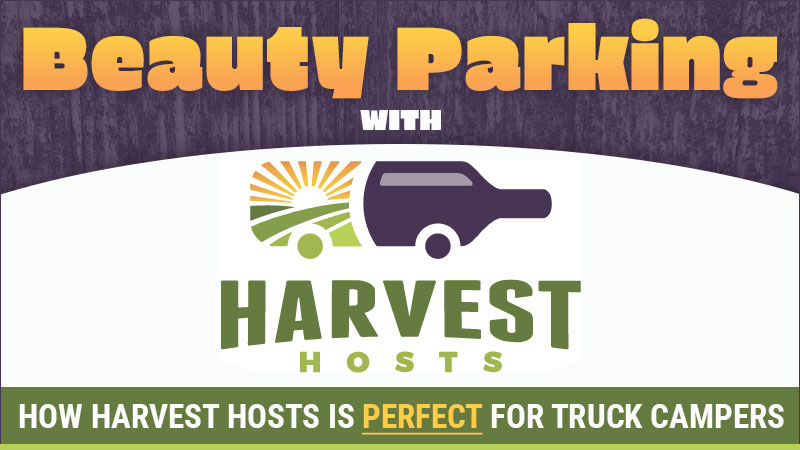
In January of 2015, we came across a booth at the Florida RV Super Show for something called Harvest Hosts. The Founders, Kim and Don Greene, caught our attention with photographs of their 2005 Lance 1030, almost exactly the truck camper Angela and I started with in 2004. Then they reeled us in with their camping program. Unlimited overnight camping at vineyards, wineries, breweries, museums, and farms across the United States and Canada? Yes, please!
Eight years later, we have camped at hundreds of Harvest Hosts locations. From the National Soaring Museum in Elmira, New York, to the Maine Military Museum in South Portland, Maine, to Lightship Brewery in Lunenburg, Nova Scotia, to Peggy Sue’s Diner in Yermi, California, to Smallwood Farms in Okanogan, Washington. I could go on, and on. You may find this hard to believe, but some of our best memories of truck camping are from Harvest Hosts locations. Seriously.
In 2018, Don and Kim sold Harvest Hosts to technology entrepreneur, Joel Holland. At first, we were concerned that Harvest Hosts might lose its community-focused spirit, but the opposite has been true. Almost immediately, there was a dramatic expansion in Harvest Hosts locations with even more compelling camping opportunities. Joel and his team also broadened the types of Harvest Hosts locations to include golf courses, churches, and local attractions. Many of our favorite Harvest Hosts were brought in after the acquisition.
In 2021, Harvest Hosts acquired Boondockers Welcome opening up yet another world of camping opportunities; the diverse properties of fellow RVers. Harvest Hosts and Boondockers Welcome now represent nearly 8,000 locations (4,495 Harvest Hosts and 3,295 Boondockers Welcome) across the United States and Canada. All totaled, you can see why our Harvest Hosts membership is a highly valued component of our personal truck camping lifestyle. We love it.
And yet, we’ve always had questions about Harvest Hosts and Boondockers Welcome. For example, what exactly is the expectation for purchase at a Harvest Hosts location? Do you need to bring a gift to a Boondockers Welcome host? How do we keep our travel plans spontaneous with the new Harvest Hosts reservation system? And, while we’re at it, are there any plans to expand Harvest Hosts into Europe?
As passionate Harvest Hosts members, we contacted Joel Holland for some answers. What happened next exceeded all expectations. Get ready for a whirlwind entrepreneurial American Dream story, some good laughs, and a deep dive into the most important alternative camping program on Earth. And we thought we had an amazing job.
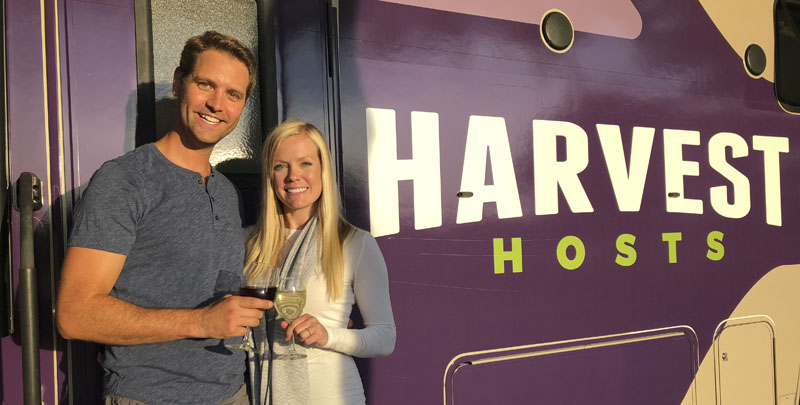
Above: Joel and Mary Ashley Holland, Owners of Harvest Hosts
Before we get into Harvest Hosts, tell us a little about your background and how you ended up becoming the owner of the company.
Before getting into the RV world, I started a company called Storyblocks. Storyblocks consisted of video, graphics, and audio memberships for the content community. Our customers were TV networks, movie studios, and advertising agencies looking for stock media to incorporate into their productions.
I was in high school when I started shooting nature videos and then selling them. I took a year off between high school and college to travel all over the country shooting video and photography of different cities. I then marketed and sold that content to pay for the next trip. Then I went to Babson College, studied business, and continued to apply what I had learned to Storyblocks.
After college in 2008, I went full-time on Storyblocks and really started growing the company. Over time we grew to 100 employees, built up a large customer base, and eventually sold the company.
During that process, I did a lot of things wrong. One of them was trying to do too much myself for too long, so I got burned out. I got burned out on where we were living, burned out on going to a cubical, and burned out by the grind. Around 2015 I realized that I needed to do something different. My wife and I didn’t have kids yet. We had the ability to do whatever we wanted. But what should we do?
I had always romanticized this idea of the great American road trip. On a lot of days, on the way into Storyblocks, I thought that if I kept going I would end up in the Shenandoah Valley. There were so many days when I’d be driving to this soul-crushing office park in Reston, Virginia and I just didn’t want to exit. I wanted to keep going. I thought, “One of these days, I’m going to keep driving and go see the country.”
One day we went to a wedding in Manassas, Virginia and there was an RV dealership nearby. After the wedding I said, “Let’s just go to the dealership and see what this is all about.” We immediately fell in love with this idea of a little home on wheels. It let my mind race towards the idea that we could not only travel freely but also have the comforts of home with us.
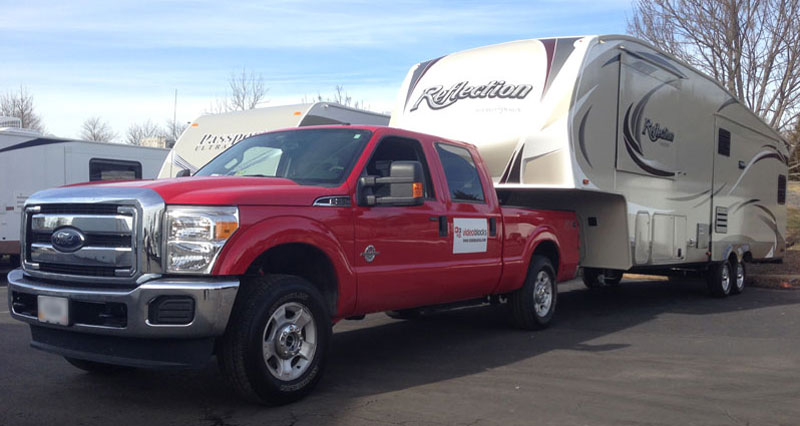
Above: Joel’s first RV, a Reflection fifth-wheel
We very, very impulsively bought a fifth-wheel RV. I literally didn’t have a truck to pull it. I told the dealer I’d be back. I ended up with a Ford F-250.
On our first weekend trip out everything went wrong. I didn’t have the correct power adapters to plug in. It was winter, so the batteries died. We had no heat. We were freezing. The next morning I couldn’t get the jacks up. It was comical.
None of that bothered me at all because I was so excited to be doing it. I felt free. The chains and shackles of the city and cubicle couldn’t get me there. Even if I couldn’t get the trailer connected back to the truck, that was okay because I didn’t want to go anywhere. It was an awesome first experience.
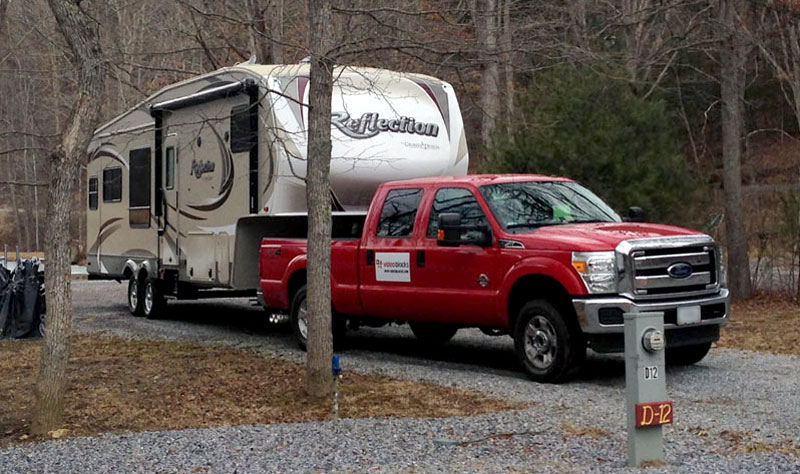
Our RVing built up from there. We took more and more frequent weekend trips while I was winding down my role at Storyblocks. We started taking longer trips, and then basically went full-time on the road. We went RVing through all of the lower 48 states.
We ended up landing in Colorado and loving the area. We drove through Vail and it really struck a cord for me and my wife, Mary Ashley. Once again we were impulsive. At first, we were going to rent a house, but then we found a house we liked and bought it. We literally parked the RV in front and unloaded it. That was six years ago.
So that was my story of burning out in my first company, eventually selling it, getting into RVing, and moving to Colorado. After selling the company, I took a year off. Having no responsibilities was awesome. I just felt so light and free. I played every day. We hiked, and we camped. I skied like seventy days that first year. It was amazing. And then all of a sudden it lost its luster. That was really disappointing, but I couldn’t control it. All of a sudden all the play, without the work, didn’t feel justified. There was no contrast. It turned out that work and play are great for balance; you need one to fully enjoy the other. I’d lost that.
“It turned out that work and play are great for balance; you need one to fully enjoy the other. I’d lost that.”
So, I started looking for the next thing to do. At first, it was fun thinking of what the next business was going to be. Then it became scary because I wasn’t finding it. I was trying to force it, which is like trying to force love. I started burning out on trying to find the next thing. Eventually, I just relaxed and stopped trying to force it. I thought about the things that I enjoy. I literally drew a Venn diagram of the stuff that I enjoy doing and the stuff that I was good at.
From my Storyblocks days, I was really good at online marketing, subscriptions, and memberships. And I really liked RVing. Those things were so clearly matched up in the middle of that Venn diagram. I intentionally set a thirty-day goal of finding a way of running a business in the RV space that has a membership.
I knew about Harvest Hosts and reached out to Don and Kim to see if they’d ever be interested in selling the company. That kicked off a multi-month conversation about potentially buying the business.
At first, their answer was no. Then they had me present them with a plan for what I would do with the business if I owned it, and how I wouldn’t ruin it. I really appreciated that. I built a plan for them, presented it, and ultimately bought the company in May of 2018.
Above: The Harvest Hosts website
So what was the plan that you presented to Don and Kim?
The spirit of Harvest Hosts was already incredible. Don and Kim had already done the hard part. I wanted to grow it so that many more small businesses and RVers could benefit from Harvest Hosts. My presentation was to focus on the hosts first. I knew from Storyblocks that we had nothing without growing more hosts. That would always be our focus, and it avoids overselling the memberships. We have a ratio of hosts to members to make sure we keep that balance in line.
The second thing was to grow the membership through advertising. Don and Kim were not comfortable spending money on advertising. They had a concept that word of mouth was good enough. I know from experience that it wasn’t true. You can have the best product in the world, but word of mouth won’t get it everywhere.
Above: A map showing Harvest Hosts locations across the United States and Canada
Today we’re at 4,300 Harvest Hosts locations plus 3,000 more Boondockers Welcome locations. That’s a big step up from the 600 locations Harvest Hosts had when I purchased the company. They were adding about 10 hosts per month. We’re adding about 300 hosts per month, not including Boondockers. With Boondockers, it’s more like 400 to 500 hosts every month.
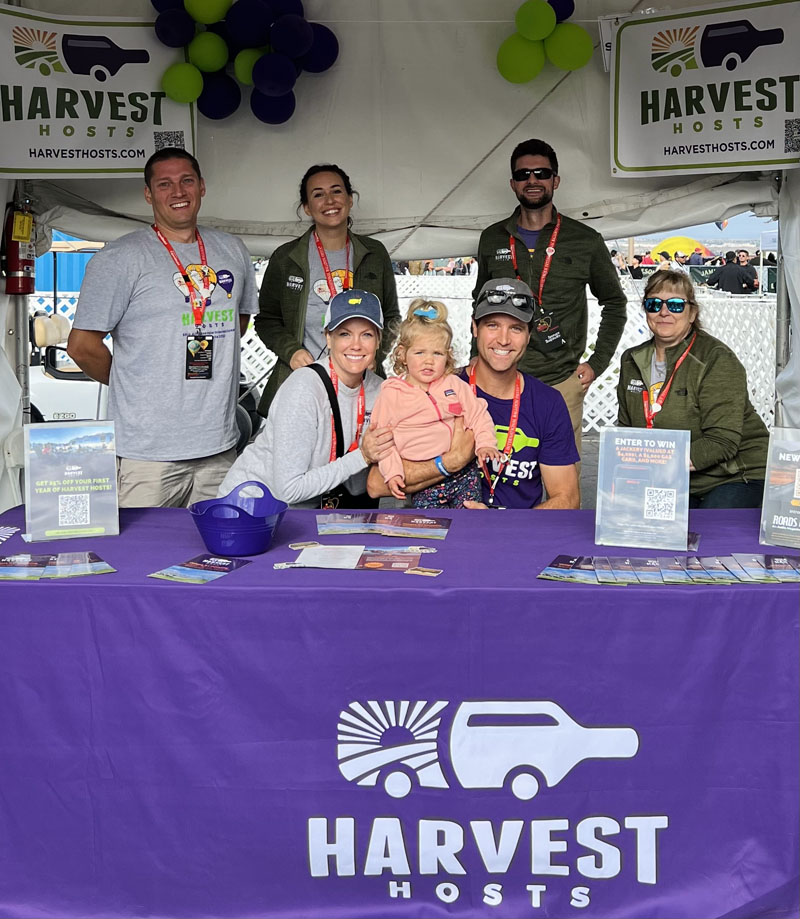
We have a team of full-time employees focused on host recruiting. We have a separate Host Success team that helps take care of our hosts. An additional customer support team takes care of our members. So we’ve built up to a pretty large business.
That was another point I made to Don and Kim. They were at an inflection point. If they kept growing, the business would get more complicated and they would have to hire people or burn out. You can’t do it all yourself. I told them in a couple of years I’d have fifty employees. They had no interest in doing that. They liked their personal freedom and didn’t want to manage a team.
When we bought the company there we 6,000 members. We now have 240,000. So our membership has grown, but we’re never overselling the platform. We’ve kept the members-to-host ratio in a very safe spot. Almost every host is asking for more members to attend. There are a few areas like Florida and around key National Parks that are always booked but, for the most part, our hosts are open. That’s great.
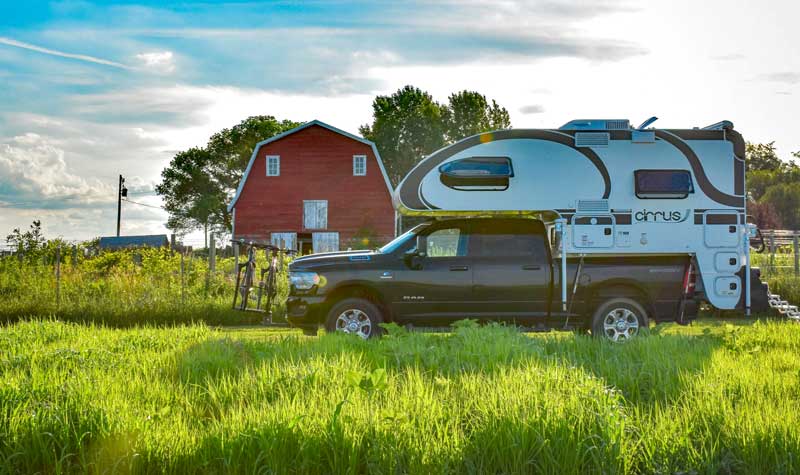
Above: TCM reader, Johanna Koester, camping at a Harvest Hosts location in Mapleton, North Dakota in her Ram 3500 and Cirrus 820
How do you make sure you’re bringing on the right hosts?
It’s a delicate game. On one hand, we want to add more hosts. On the other hand, we need to keep the quality high. Each team member uses the OKR framework, which stands for Objectives and Key Results. One of the Key Results for our recruiters is that the new hosts don’t leave the system within a year.
There are a couple of ways hosts leave. First, they sometimes leave because Harvest Hosts wasn’t a good fit for them, or they were oversold on what the program could provide. And second, we can kick them out. All of the hosts are member reviewed on our platform. If members complain about a host, we take that complaint very seriously. We’ll try to remedy the complaint, but it’s a pretty low tolerance.
If a host leaves within a year, the recruiter doesn’t get credit for that host. So they have to be very careful about who they bring in. They need to make sure they’re a good fit.
When someone applies to be a host, we vet them. We make sure they’re a legit company, check out their social media channels, use Google Earth to do a virtual drive into their location, and ask a lot of questions like, “Do you have trucks that drop off things at your property?” If a SEMI can reach them, an RV can as well. If it’s a really ugly parking lot, we don’t let them in.
There’s also a balance between location versus scenic. For example, we have a winery in Denver. It’s not the most scenic winery, but it’s the only place in Denver where you can go camping in an RV. The RV parks are so far outside Denver. So we let them in the program and our members love them. They’re really nice people. It’s good wine. And you can stay in Denver.

Above: The Harvest Hosts online reservation system
Prior to your acquisition, making a reservation through Harvest Hosts program was fairly casual. You called a host 24 to 48-hours in advance, and made a reservation. Now reservations are made through the Harvest Hosts website or phone app. What led to the reservation system change?
That was the third prong of my presentation to Don and Kim. After more hosts and more members, Harvest Hosts needed better technology. The world now expects to be able to book everything through their phones.
As the member numbers increased, keeping the reservation system casual would become untenable. Imagine 240,000 members trying to contact a host that’s sold out. We knew some hosts would be overrun with phone calls.
We do a lot of surveying of our members. We ask probing questions like, ‘What would you like changed?’ and ‘How can we make it better?’. One of the most common themes we heard was the ability to view host availability and book.
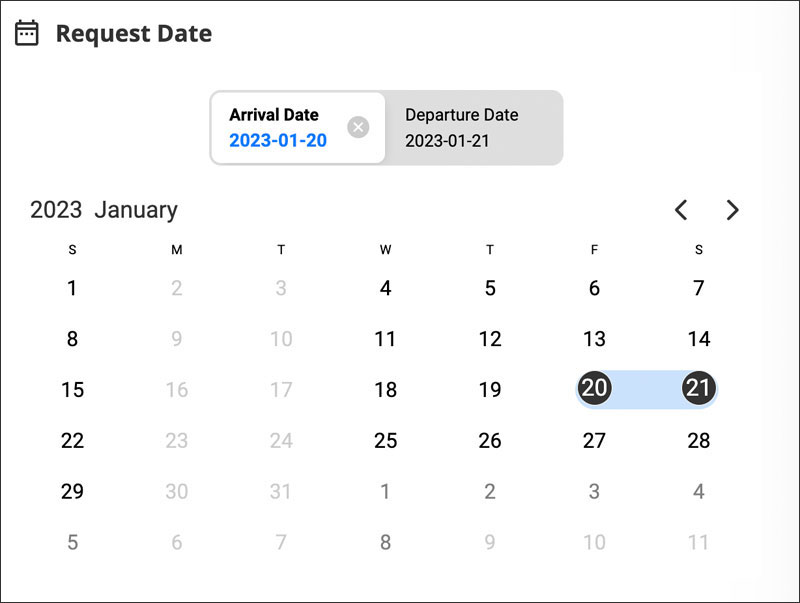
Above: The Harvest Hosts online calendar request form
Moving to the booking system online was a big decision. We ended up needing to hire a technology team and it took almost a year to build that product. I’m so glad we did it as almost 80-percent of our hosts are on that platform. That gives us so much more data on what our members are doing. This is very helpful for host recruiting. We can tell if members are searching for places that are booked and we can see that we need more hosts in a location at a certain time of the year. That information goes back to our host recruiting team.
Don and Kim were always very careful about sharing host information. For example, they didn’t want members revealing the name of hosts on Facebook. What I realized was that many of our hosts want exposure. They greatly benefit from our members posting about them on social media; posting photos, tagging them, and liking them. That’s actually one of the reasons they like being in the program.
Now that we have the booking system, we’re free to let people talk about where they’re going. Ultimately, if someone doesn’t have a Harvest Hosts reservation, they’re a trespasser. That makes membership and reservations easier to enforce.
It was the worst kind of RVer who was taking the Harvest Hosts information and using it without membership. They were showing up, not buying products, and just staying on the property. Then Harvest Hosts was getting blamed for having bad members. Now we can say if someone shows up and they’re not on the books, they’re not in the program.
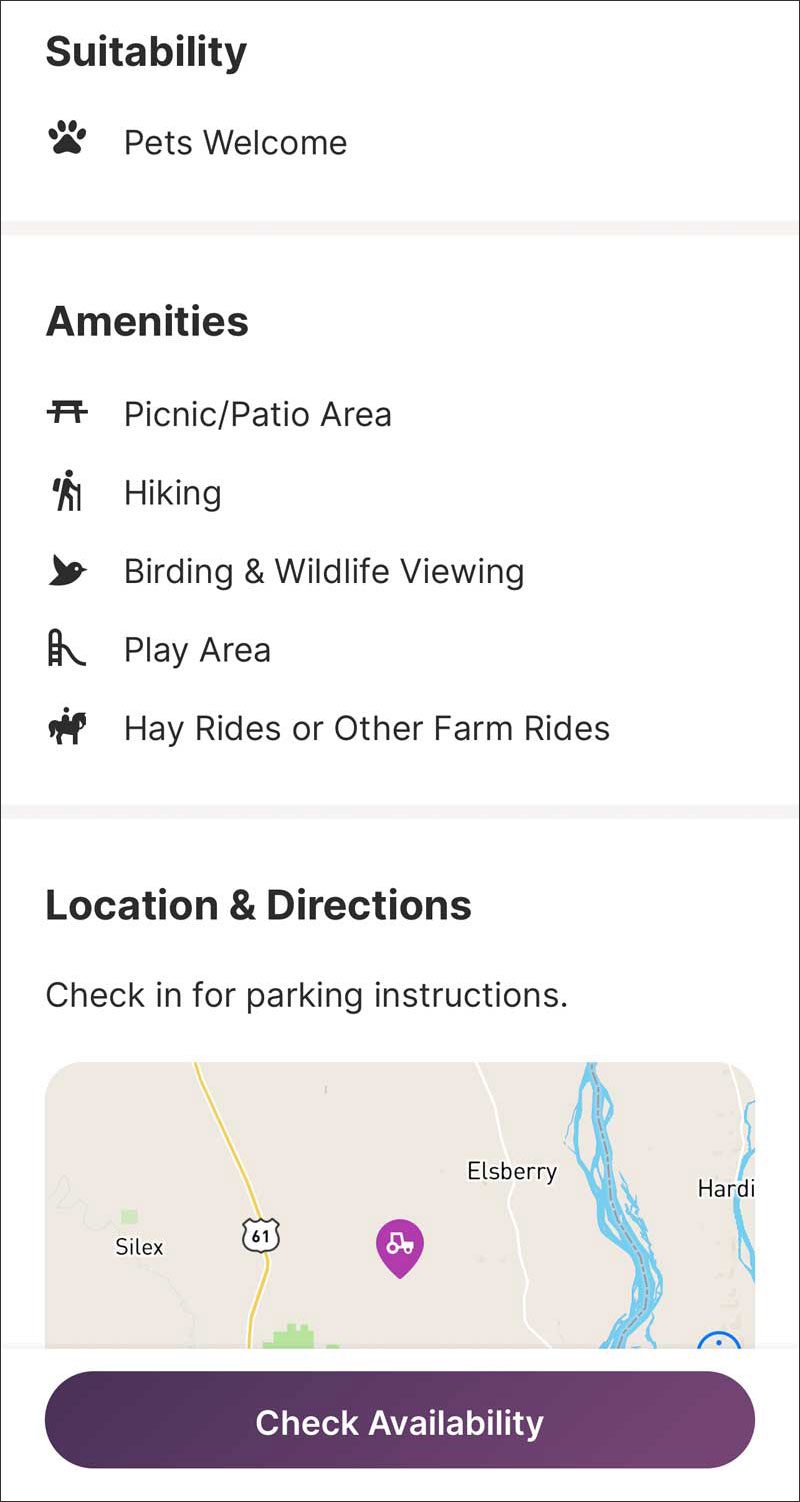
Above: The online Harvest Hosts system includes details about the host location and ability
So, online booking is very beneficial for everyone involved. There was a charm to calling up the host and having a conversation. That’s a bummer. That conversation still happens, but now it’s when members arrive.
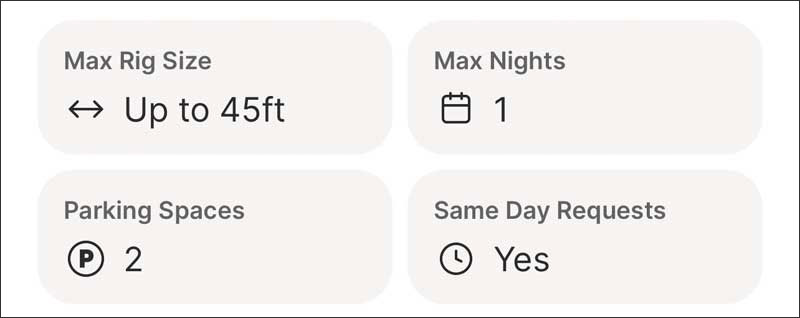
Above: Listed hosts feature information including max rig size, available parking, and whether or not they allow same-day requests
A lot of truck camper owners prefer to be spontaneous in their travels. They may not know where they’re going to be one week to the next, or even one day. With this short notice, can they still take advantage of Harvest Hosts?
One of our favorite benefits of RVing is waking up and deciding what we want to do that day. Spontaneity is the whole point. That was one of the things I changed about Harvest Hosts. Don and Kim were very strict about not making bookings within 24-hours of your arrival. I didn’t like that. We also found that a lot of hosts were fine with same-day reservations. Now we let the hosts decide.
As far as availability, there’s no real difference between the online booking system or calling. Some hosts would be booked out a week in advance or more either way. The booking system is just a different approach. Another factor is that the popularity of RVing has exploded over the past couple of years.
We are building a cancellation tool that will allow members to enter the place where they want to stay and have the system tell them if there’s a cancellation in that area. We also put the no-show policy in place about a year ago with a ‘three strikes you’re out’ rule. That helped with people making reservations and not showing up. This year we added a no cancellations within 24-hours rule. Again, this is to avoid people reserving a host spot and not showing up. It’s not good for the hosts. It’s not good for the members. So we’re using technology to remedy the capacity problem, but really the answer is more hosts.
“One of our favorite benefits of RVing is waking up and deciding what we want to do that day. Spontaneity is the whole point.”
One challenge to the Harvest Hosts program that we have seen is that members show up at a location after the business has closed, and have to leave before they open. This happened to us once in Canada this past summer when our day ran late. In that situation, how can we support the host?
That’s another of the more common requests we have. One of the solutions we are testing is essentially a tipping feature. That way if a member comes to a host but they don’t want to buy the wine, or they show up too late to buy the wine, or they don’t want to buy any more wine, they can still tip and leave without feeling guilty. We’ve started testing the tipping feature. I think it’s going to be a good solution. Most people are good and they really want to fulfill their social contract and support the business.
Harvest Hosts slides under the radar because our whole thing is we’re not selling the camping. We’re just connecting our members with businesses, and our members patronize the business. It’s hard for municipalities to argue against helping the small businesses they represent. I’m hoping the tipping feature doesn’t cause an issue on that front. If we were to have a pay-to-stay program, it would be a nightmare.
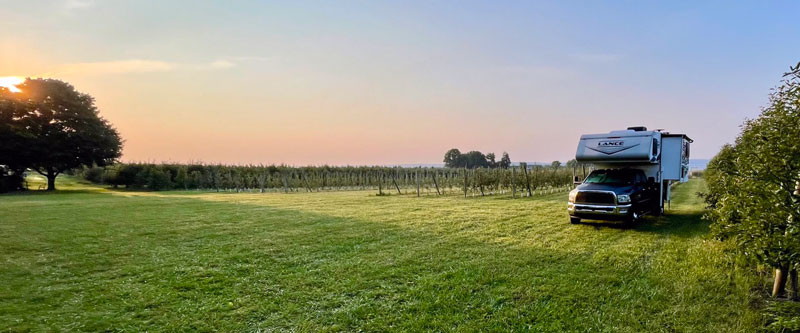
Above: TCM reader, Jay Groves, staying at a Harvest Hosts location in Bird-In-Hand, Pennsylvania with his Ram 3500 and Lance 975
Is the Harvest Hosts self-contained requirement to be fully-self contained, or behave fully-self contained?
Thank you for the question, as it is one we get a lot, and there is some grey area. Technically, all of our members must be fully self-contained. Our main requirement for self-containment is an indoor bathroom and the ability to trap water and take out everything you bring in. Therefore, cassette toilets and water traps are acceptable.
Fully self-contained also means only using your interior flush toilet, cassette toilet, or portable toilet product, and never, under any circumstances, emptying a portable toilet or any liquids at a Host property. The main thing, that is quite obvious and your readers would never do, is that going to the bathroom outside on Host properties is absolutely a no-no and will end in termination and potentially prosecution.
On the Harvest Hosts website, you state that membership includes unlimited overnight stays with no camping fees. That’s true, but we have always understood that the Harvest Hosts business locations expect at least a $20 purchase during your stay. Is that what you recommend?
In our code of conduct, we say to take a percentage of the money you would have spent at a campground and support the business by buying their products. We recommend a minimum of $20. Through our surveying, we find that the average member spends $50 per night. That probably lines up close to what they would have spent at a campground.
On that same subject, what’s the protocol for gifts with Boondockers Welcome?
For Boondockers, the social contract is more the community aspect; having a conversation and saying thank you. I always take some local Colorado beer and either drop it off with a thank you note – if I don’t see the host – or offer to have a beer on the deck. That’s always been my approach, and it’s kind of what people tend to do.
Most Boondockers Welcome members bring a gift from their home town or travels, but there’s less expectation on the Boondockers side. The hosts are sharing out of the kindness of their hearts, which is pretty cool. If the host allows you to connect to electricity or water, we recommend giving them $5 or $10.
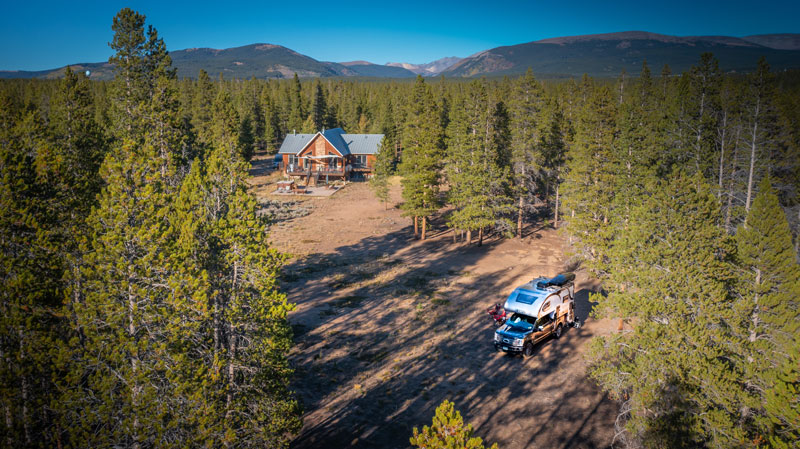
Above: Joel and Mary Ashley Holland’s Cirrus 820 visiting a Boondockers Welcome location
The cost of the annual Harvest Hosts and Boondockers Welcome membership fee has increased significantly since you took over the company. Currently starting at $99 and $79 per year respectfully, how do present the current value of a Harvest Hosts membership?
When I bought the company, I told Don and Kim that their membership price was too low. They were underselling the concept and making it feel cheap. So there were a number of reasons why we increased the price.
I wanted to bring the price up to make it clear that this is not a way to get free camping. I wanted the people who were trying to use this product to avoid spending any money anywhere to be priced out. I think it’s helped. We’ve more than doubled the price now and the free chasers have largely gone away.
The pitch to the price increase is that we’ve increased the host count by more than ten times across Harvest Hosts and Boondockers Welcome, but we’ve only doubled the price. The value is still way up over where it was. It used to be $49 per year for 600 locations. Now it’s $99 per year for 4,300 or 7,000 locations, depending on what membership(s) you buy.
Another thing we’ve done is to lock people into the rate they purchased at. When we raised prices, we told existing members we weren’t raising prices on them. We appreciated their loyalty. And two, we told them that we were raising prices in three months. That told anyone who wanted to become a member that they had three months to lock in the original rate.
We saw a huge influx of new members wanting to get in before the price went up. And we’ve honored our commitment. We’ve never raised prices on anybody. I think that’s why there wasn’t a backlash. And for new members, they’re getting a lot more value, so the higher price makes sense.
I see now and then on social media someone posting that Harvest Hosts is too expensive. I love that comment. If $99 is too expensive for someone, they’d be a terrible member. They would be the kind of people who wouldn’t spend any money at the hosts. I don’t think that $99 is a lot of money after you spent $100,000 on your rig. So I’m always happy when I see someone say it’s too expensive because they’re self-selecting out of the program which is exactly what I wanted.
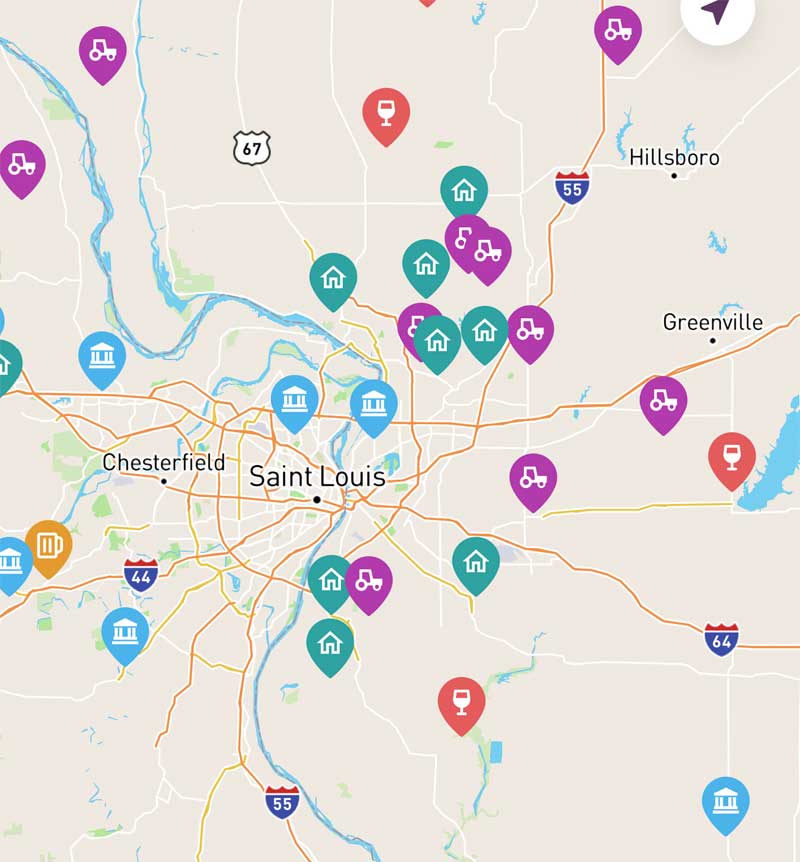
Above: There are many different categories of hosts to appeal to different interests; Boondockers Welcome (houses), vineyards (wine glasses), museums (buildings), breweries (mugs), and farms (tractors) are represented on the map with symbols.
In the beginning, Harvest Hosts consisted of wineries, breweries, distilleries, museums, ranches, and farms. Are these categories of businesses you want to further expand into, or are you staying focused on the same business types?
Those business categories are our core, and we are going to keep growing the core. From our research, we have barely scratched the surface of the locations in each one of those categories. And the more we have the easier it gets to add more of those hosts.
We’re also adding new categories. An example recently is churches. We had a church in Lake Tahoe apply a year ago. We thought, “This is different. Let’s try it”. Over the course of a year, our members loved staying there and the church got $12,000 in donations. So the church was ecstatic.
Now we’ve added 200 churches this year. Churches are the fabric of a lot of towns. It feels good and is in line with our mission to support an organization that supports its community.
So the new division will be Holy Hosts, or something.
We call them Holy Rollers.
Harvest Hosts was originally inspired by a program in France called France Passion. Do you have any plans to expand Harvest Hosts into Europe, or partner with the programs that already exist there?
Yes. I love Europe. We’re actually in talks with a company in Europe about acquiring them. It’s not France Passion, but it is a European version of Harvest Hosts. This will be our first foray into Europe and I’m very excited about it.
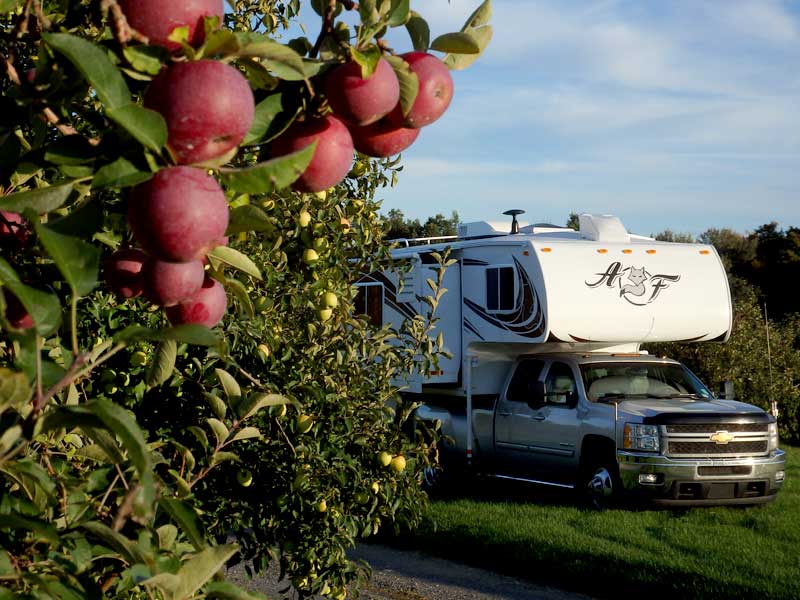
Above: TCM readers, Chuck and Jodie Ramsey at an apple orchard in Gardiner, New York with their Chevy Silverado 3500 and Arctic Fox 990
That sounds like a great idea. In your opinion, what are some of the more interesting Harvest Hosts locations?
We describe ourselves as unique RV camping. We have a winery in a cave. We have a museum of osteology. We have the Museum of Clean dedicated to the history of vacuum cleaners. There’s the Golden Spike Tower in Nebraska which is the largest train yard in the world. Or the Strataca, the underground salt museum in Kansas where you can go on a tour and see how salt is produced. For me, the more unique the better.
We’re probably best known for our wineries because the settings are often so beautiful. However, the category that is now disproportionately requested is breweries. They’re really hot. We just passed over 500 breweries on Harvest Hosts.
“We describe ourselves as unique RV camping. For me, the more unique the better.”
We love the unique locations as well. Don and Kim Greene talked about a Code of Conduct for Harvest Hosts members. How has the Harvest Host Code of Conduct evolved since you took over the company?
It’s a living document that changes based on host and member complaints. Being self-contained has always been required. Not showing up without a reservation is a big one. Sometimes members just show up, and that’s not okay. We’ve had to add some obvious things like taking all trash with you. For the most part, RVers are very respectful. It’s a pretty obvious and simple code of conduct.
When we first got into Harvest Hosts, we thought the program was absolutely natural for the truck camper community. For example, the go anywhere, camp anywhere capability really helps with some of the more remote locations.
Absolutely. I think truck campers are backward compatible with all of our inventory. With a truck camper, you can get to every single location without any stress.
When I talk to our members with the large Class A motorhomes, they have a lot more stress. They can be 55,000-pounds. If they park on the grass, they can sink. We have lots of Class A members, but with a truck camper, it is much less stressful.
“With a truck camper, you can get to every single location without any stress.”
Where do you see Harvest Hosts in five years?
In five years, if I’m still having fun running the company with the RV industry and lifestyle, I’m pumped to keep going. With Storyblocks, towards the end, I was just done. I was burned out. I did too much myself for too long. This time I’ve intentionally hired really good people from the beginning to handle things like operations and human resources. That leaves me open to focus on the product and marketing, which is what I enjoy.
I’m having a blast right now. I’m lucky that Storyblocks gave me the ability to have that mentality. For me, it’s not about the money on this business venture. Building it into a profitable business is fun. As long as it remains fun, I will keep it going.
My five year plan is to get Harvest Hosts to a million members and 20,000 hosts. Internally we have a five year plan moving towards that. That’s an ambitious goal and we may never get there, but I feel that there are easily a million RVers that would benefit from Harvest Hosts and easily 20,000 businesses that would benefit as well.
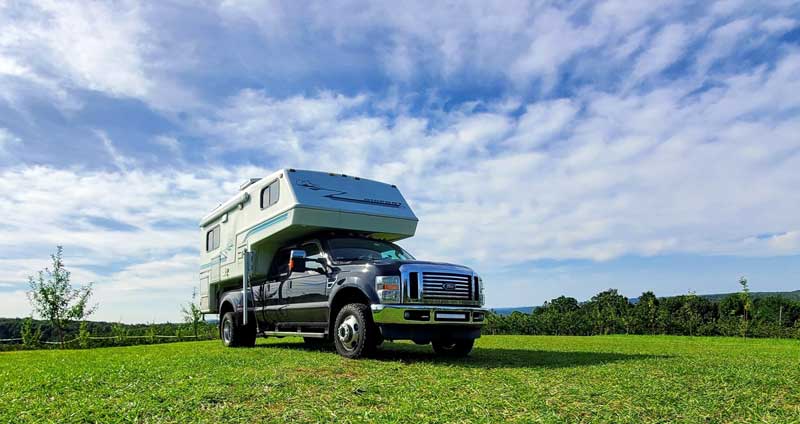
Above: TCM reader, Brian Bach, at a Litchfield, Connecticut Harvest Hosts location with his Ford F350 and Bigfoot 10.6
It’s a crazy goal, but it doesn’t sound unreasonable. Is there anything else about Harvest Hosts or Boondockers Welcome that you want people to know about?
We’re investing heavily in the acquisition side of hosts. That’s the life blood of the program; making sure we have great hosts that our members love. That is what the company is about.
I think every RVer should try Harvest Hosts, at a minimum, because it’s such a fantastic experience. I think people put boondocking on a pedestal. I get that. In our first year, we never boondocked. That was scary. We wanted the safety of a campground and hooking up to electricity and water.
The funny thing is, boondocking is actually way easier. You just go park somewhere. I want to change the term to beauty parking. I think the term boondocking is too technical when the reality is that all you’re doing is beauty parking. That’s the message I’m trying to get out to people. If you haven’t tried boondocking, you’re really missing something. And it’s easy.
Click here for more information about Harvest Hosts and Boondockers Welcome.
